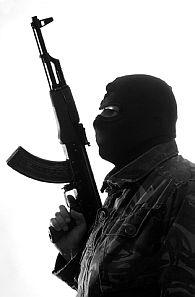 Asserting that Lashkar-e-Tayiba is a terrorist network supported and nurtured by the Inter-Services Intelligence of Pakistan, a top American lawmaker warned that Islamabad would have to bear the responsibility of any terrorist attack on the US coming from LeT.
Asserting that Lashkar-e-Tayiba is a terrorist network supported and nurtured by the Inter-Services Intelligence of Pakistan, a top American lawmaker warned that Islamabad would have to bear the responsibility of any terrorist attack on the US coming from LeT.
"We should make it clear to Pakistan that any LeT attack upon our homeland, they will bear responsibility for that because of their close relationship between ISI and LeT," Congressman Peter King said during a Congressional hearing on Wednesday.
Designated as a terrorist organisation by the United States and the United Nations, LeT, King alleged is a proxy of Pakistani intelligence.
"I think it's important to note that. The LeT is a terror proxy of Pakistan's Inter-Services Intelligence, its ISI, which provides LeT with a safe haven and funding to train and prepare for terrorist attacks," he said.
King, the Republican lawmaker from New York, is chairman of the Counterterrorism and Intelligence Subcommittee of the House Homeland Security Committee.
"While focused on Pakistan's dispute over Kashmir, an issue over which it regularly kills innocent Indian civilians, LeT's reach is broad and goes abroad. In addition to the 2009 plot in Denmark, LeT supported a planned 2002 attack on Australia by means of a trainer sent from France," he said.
LeT's networks span across South Asia and the Persian Gulf into Europe, especially Britain, as well as Canada and New Zealand, King added.
"LeT actively recruits Westerners, maintains social media sites in colloquial American English and has since the 1990s sustained support cells here in the United States. LeT members were arrested in the homeland as recently as 2011 when Jubair Ahmad was arrested in Woodbridge, Virginia.
"Eleven LeT members previously have been arrested in Virginia back in 2003. Suspected LeT operatives are reported to have surveilled several identified potential terror targets in this country," he said.
"LeT practices good communication security and is proficient at surveillance skills, making it a difficult target for our intelligence collection efforts, which should be immediately increase on this target. LeT maintains ties with Al Qaeda.
"They fight together against us in Afghan provinces of Ghazni, Kunar and Nuristan. LeT terrorists earlier fought our forces in Iraq. When our special operators raiders Osama bin Laden's compound in Abbottabad, they reportedly recovered correspondence between the late Al Qaeda leader and the LeT leader, Hafiz Saeed," King said.
The New York lawmaker demanded that the US government declassify as many of the documents recovered in Pakistan on May 2nd, 2011, which could well amplify the relationship with LeT.
"That is an ongoing process. I think it should be done sooner rather than later," he said.
"Given that LeT has killed American civilians in India, fights US soldiers in Afghanistan and is operationally active in this country, we must consider the possibility of a future
LeT strike in the homeland," King said.
Democratic Congressman from New York, Brian Higgins, said that there is evidence that Al Qaeda has sought to replicate the Mumbai attack tactic in the West.
"We know that Al Qaeda seeks to recruit Americans for their plotting and execution of terrorist attacks. We also know that Hezbollah has a presence in North America. Do these groups have a capability to execute a fidayeen-style attack?" he said.
In his testimony, Joseph Pfeifer, chief of counter terrorism and emergency preparedness for the Fire Department of New York, the devastating 2008 attack in Mumbai represents a game-changer.
"Over three days, a city of nearly 14 million people were held hostage, with 166 people that were murdered in multiple locations, introducing a new model of -- for terrorist attacks," he said.
"The salient features of a Mumbai-style attack includes multiple terrorists, multiple targets and multiple modes of attacks deployed over a prolonged period to amplify media attention. Despite all of the violence, the most iconic images from that day remains those of the Taj Mahal on fire. The pictures of people at the window of the hotel trying to escape the flames are reminiscent of 9/11," Pfeifer said.
Christine Fair, assistant professor in the Center for Peace and Security Studies within GeorgetownUniversity's Edmund A Walsh School of Foreign Service, said Lashkar-e-Tayiba, which now generally operates under the name Jamaat-ud-Dawa, is the most coherent terrorist organization operating in and from Pakistan.
"It enjoys the complete unfettered support not only of Pakistan's intelligence agency but has even enjoyed at certain periods in time financial support from the Punjab government, which is the relevant province in which Jamaat-ud-Dawa was situated, as most of its infrastructure is actually there," she said.
Fair said the Indian Mujahideen is a proxy organization for Lashkar-e-Taiba, so that when the Indian Mujahideen conduct attacks, the Pakistani state can put an additional layer of buffer between it and those attacks.
"I think we need to do whatever we can, using our tools of foreign policy, to really restrict that scope for plausible deniability," she argued.










